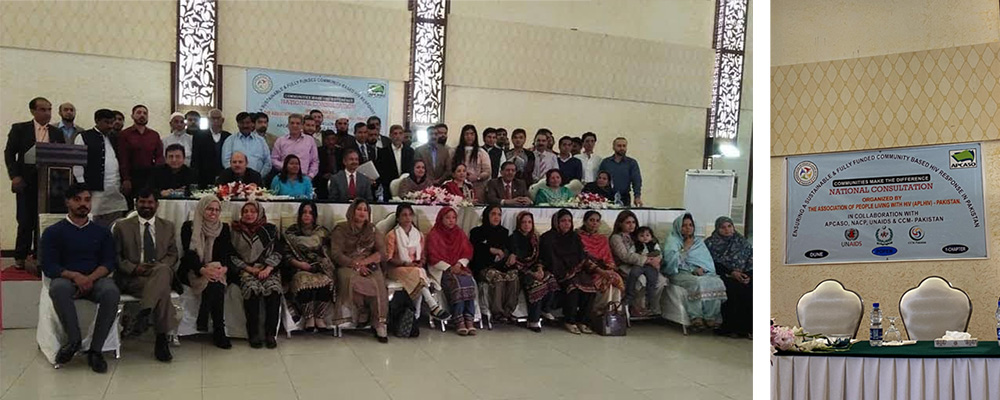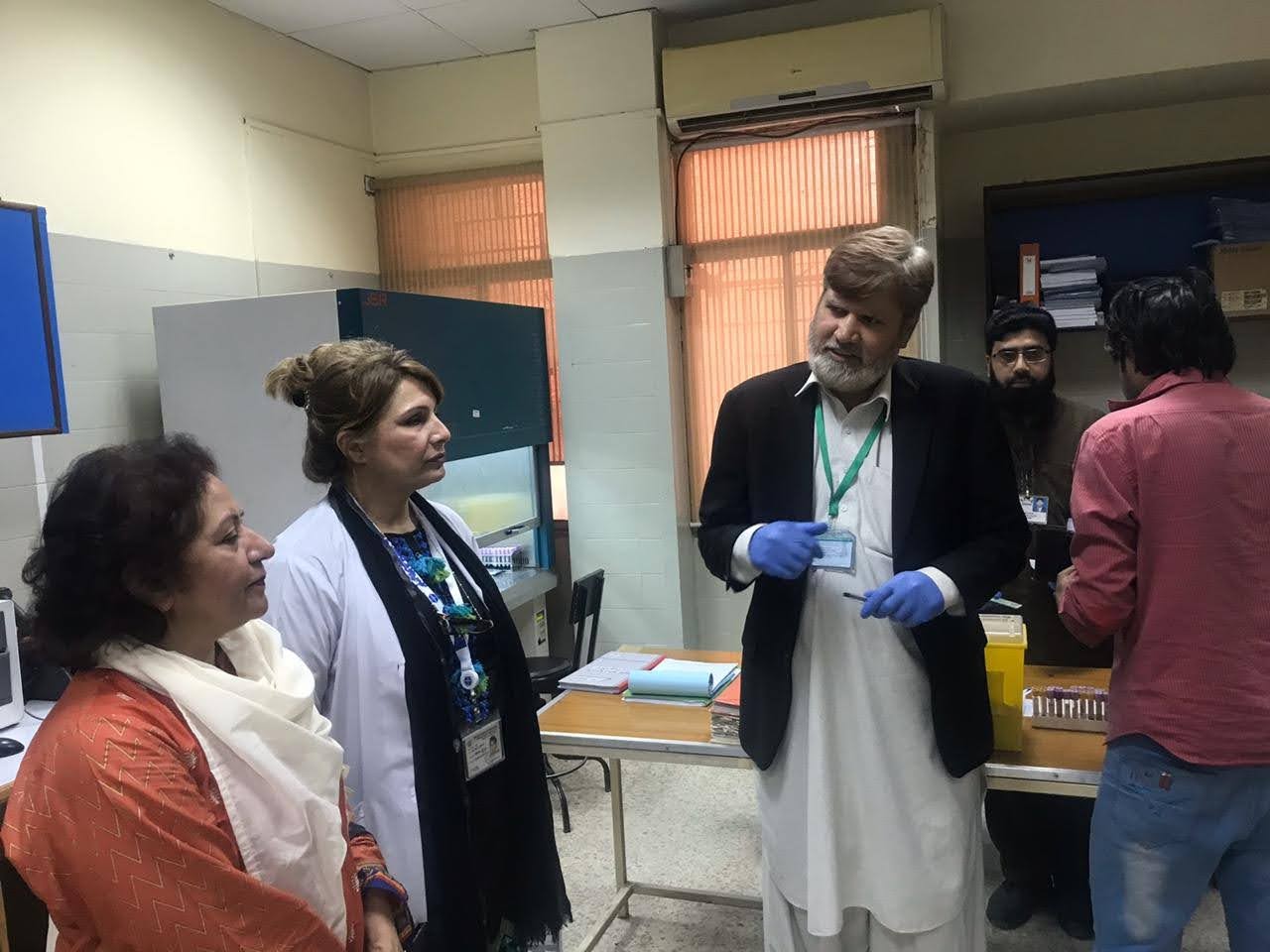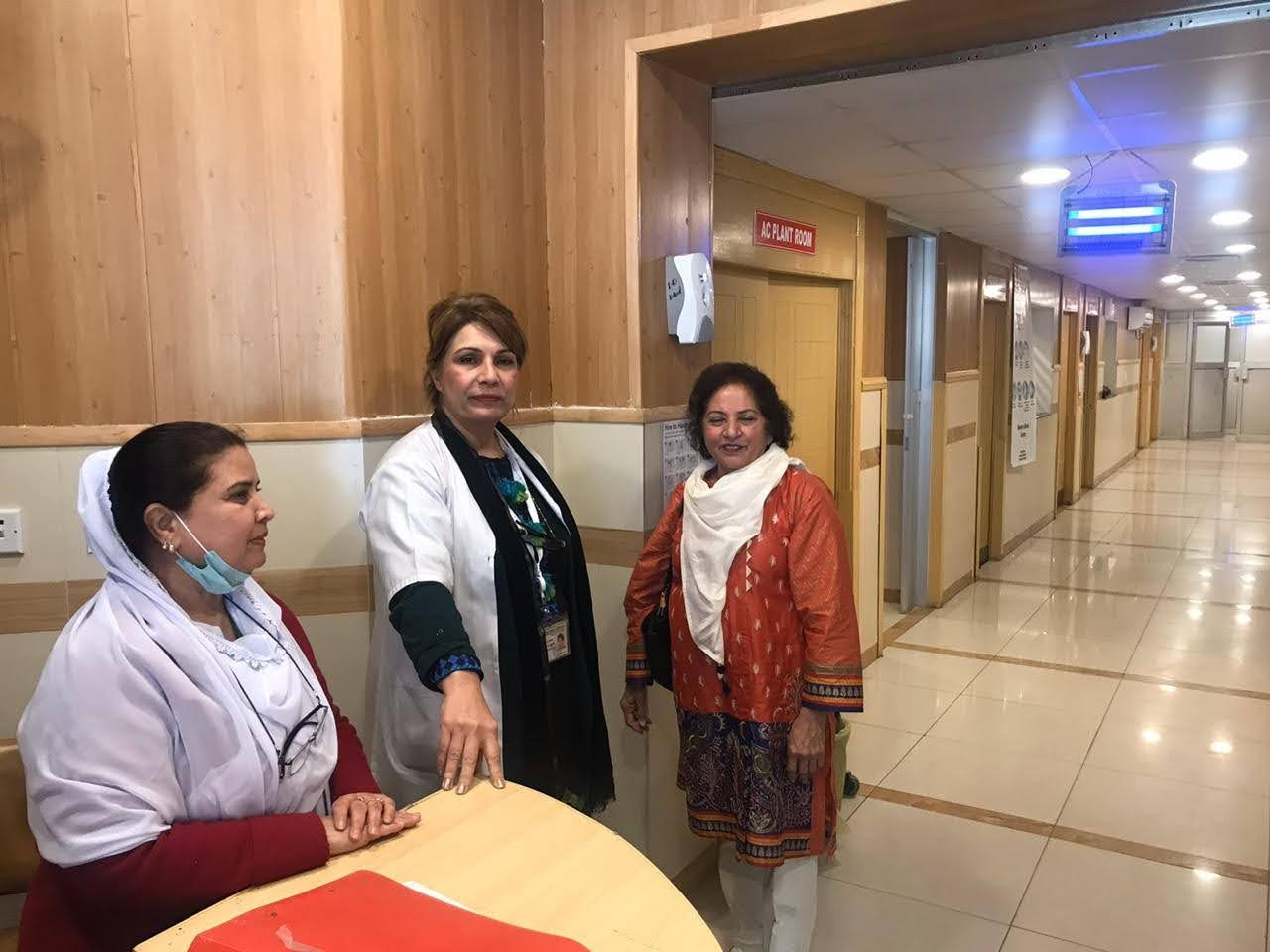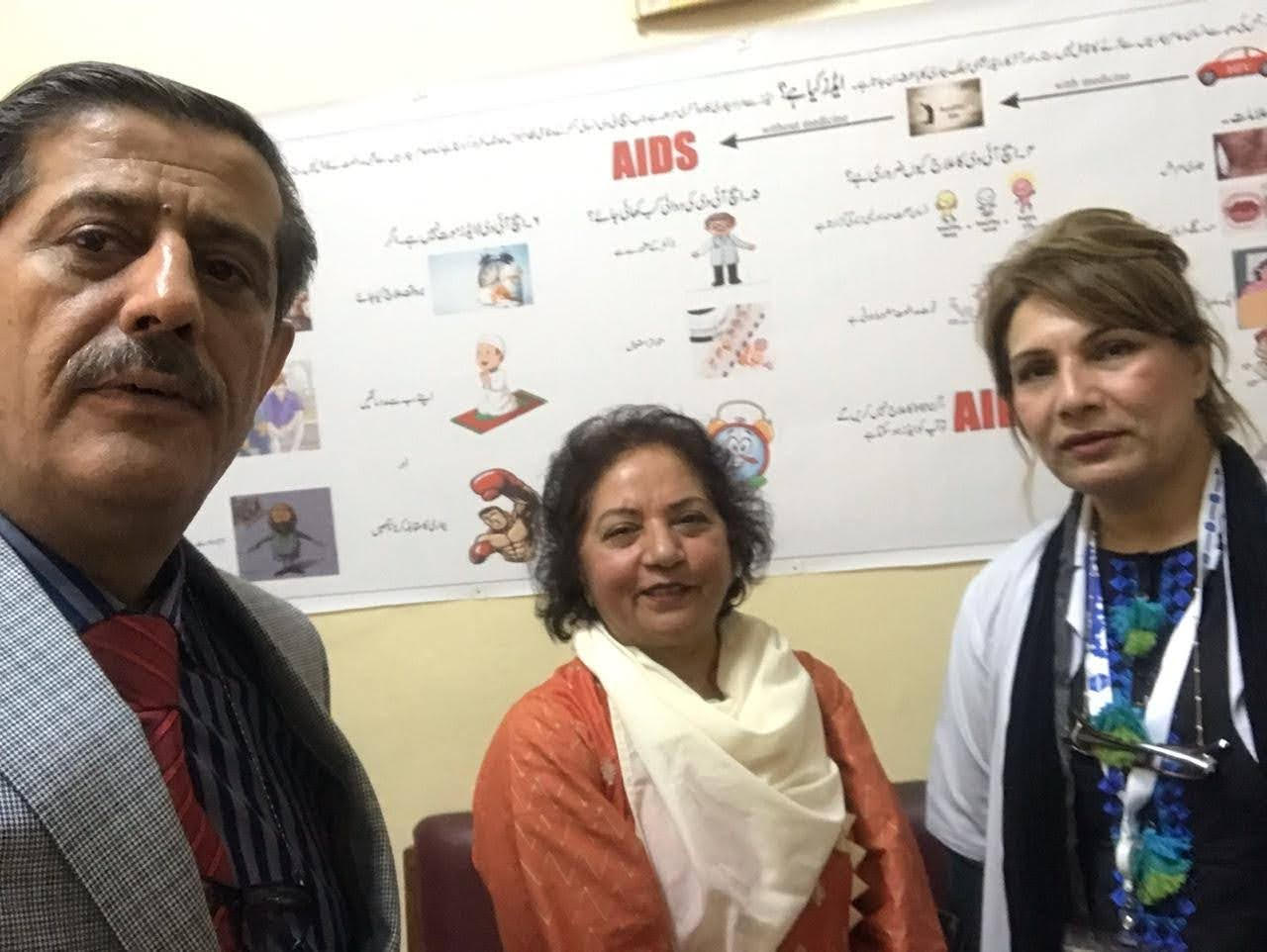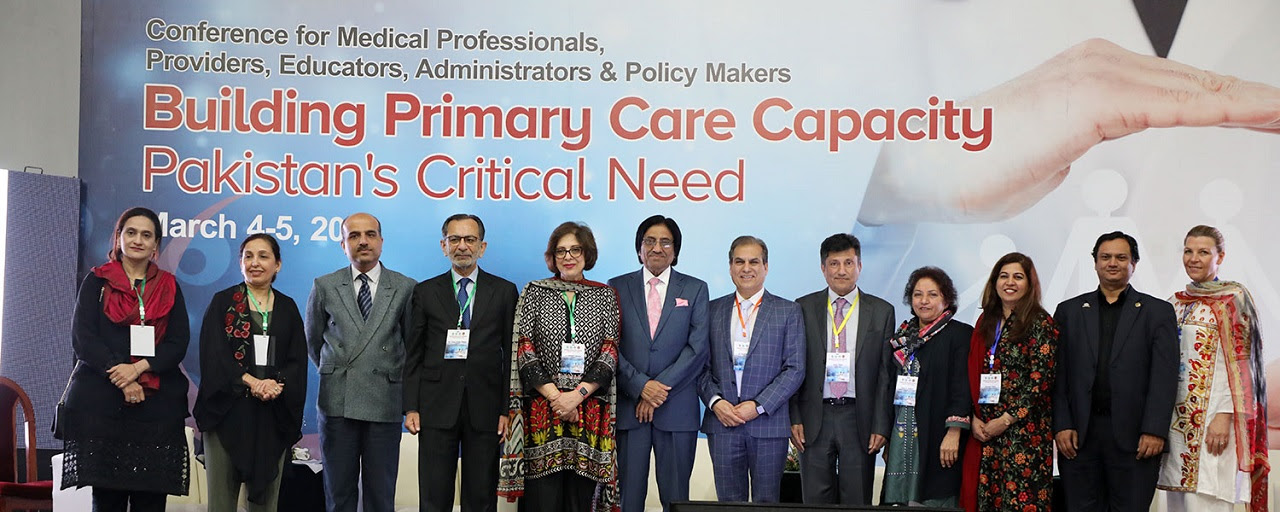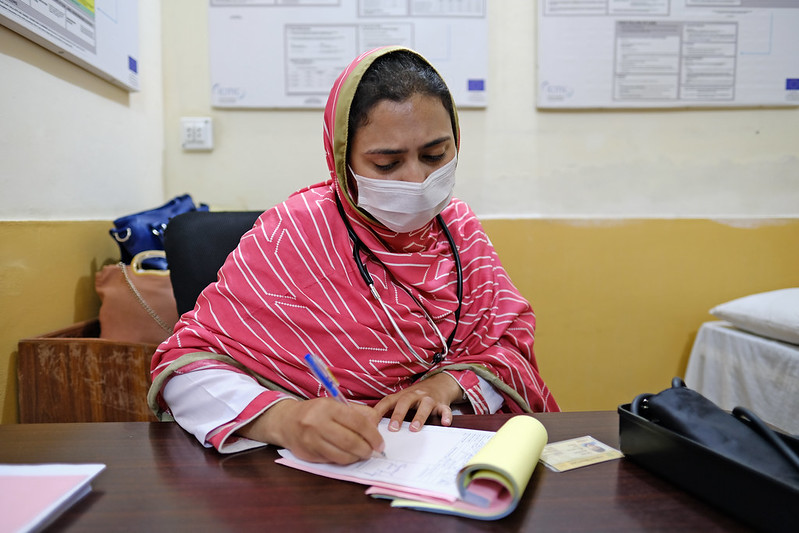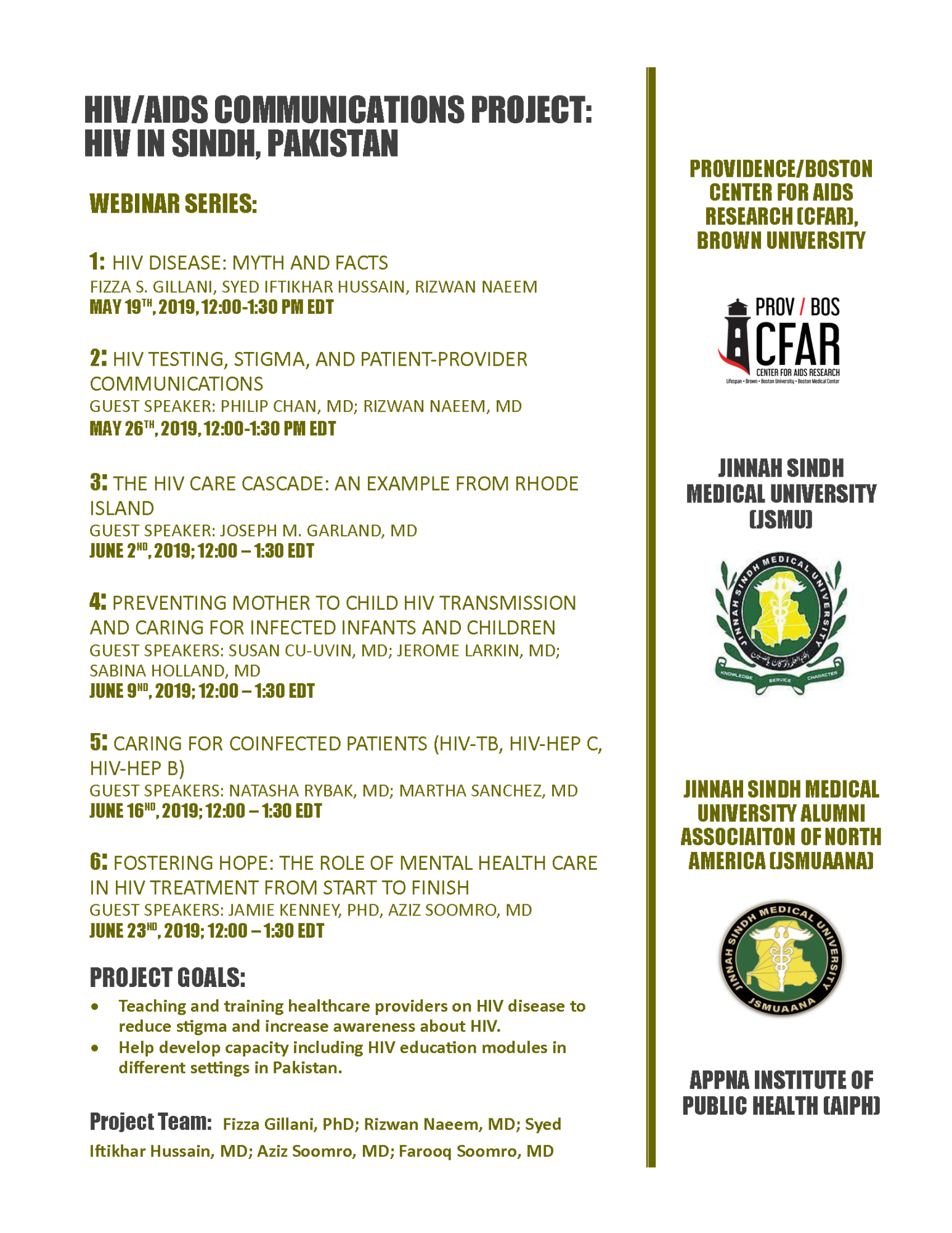|
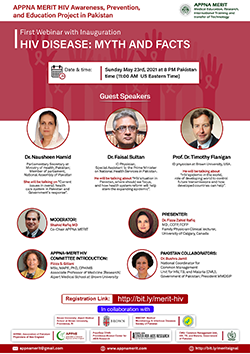 Webinar 1: HIV Disease: Myths and Facts - 5/23/2021 Webinar 1: HIV Disease: Myths and Facts - 5/23/2021
This webinar describes the ongoing epidemic in Pakistan and the initiatives of the APPNA MERIT HIV committee in raising awareness about HIV in Pakistan, which include collaborating with local healthcare institutions in Pakistan to help increase awareness about the HIV/AIDS disease. These activities aim to empower providers, patients, and communities with accurate knowledge about the disease, while decreasing stigma surrounding routine testing and HIV diagnoses. There is often miscommunication around how HIV is spread, and the largest barrier to controlling the HIV epidemic in Pakistan has been denial and stigma. Increasing access to accurate education about HIV, normalizing testing for HIV, and encouraging open and informative conversations in Pakistan would make a large difference in transmission control.
View Webinar on YouTube Download Report 1
|
|
 Webinar 2: HIV Testing, stigma, patient-provider Webinar 2: HIV Testing, stigma, patient-provider
communication, and the HIV Care Cascade – 5/30/2021
This webinar describes the need for increased awareness about the HIV disease, destigmatization, normalization of routine testing, and improvements in patient-provider communication to address the HIV epidemic in Pakistan. Current challenges in Pakistan to combat this epidemic include linking patients to treatment, retaining patients in care, managing data, and identifying donor funding. In addition, further efforts are needed to reach hidden key populations. By monitoring and improving these efforts, the public health community in Pakistan can help to combat the stigma and discrimination related to the HIV disease, ultimately leading to increased screening and treatment outcomes for HIV throughout Pakistan.
View Webinar on YouTube Download Report 2
|
|
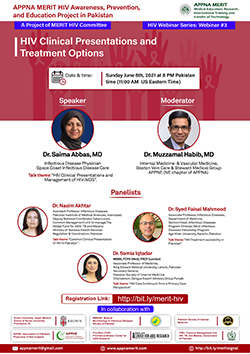 Webinar 3: HIV Clinical Presentations and Treatment Options – 06/06/2021 Webinar 3: HIV Clinical Presentations and Treatment Options – 06/06/2021
This webinar identifies the HIV/AIDS presentation and describes the traditional, misinformed, and well-informed approaches to diagnosis. There is significant stigma around HIV testing and diagnosis, both of which have acted as barriers for prevention of further transmission. Primary HIV infections often go undiagnosed because there is not a high degree of clinical suspicion. Further, there are constraints with diagnosing patients and limited availability of treatment.
Clinical intervention can be managed at the primary care level and should include routine labs, ART clinic referrals, and counseling. Transmission reduction proposals including needle exchange programs, increased testing, and post-exposure prophylaxis should be introduced to prevent further spread of the concentrated epidemic.
View Webinar on YouTube Download Report 3
|
|
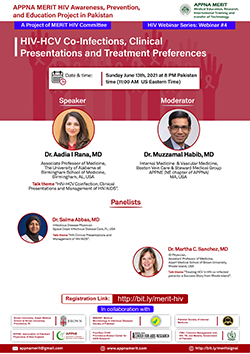
Webinar 4: HIV/HCV Co-infections, Clinical
Presentations and Treatment Options – 06/13/2021
This webinar outlines and describes the prevalence and features of HIV and Hepatitis C coinfection. Pakistan has one of the highest Hepatitis C infection levels worldwide, with many cases originating from healthcare-acquired transmission. Despite the availability of generic direct-acting antivirals and reduced treatment costs, the prevalence of Hepatitis C remains persistent, with no evidence of declining prevalence. There is a large gap between infection and treatment, with a lot of people unaware of their Hepatitis C status. Early intervention and treatment are important in co-infected patients because HIV is independently associated with Hepatitis C progression. Patients with coinfection require dual therapy, which includes many guidelines to prevent drug interactions and contraindications. Encouraging collaboration between specialists as well as training family physicians, simplifying guidelines by adapting them to local conditions, and empowering general practitioners to approach testing and treatment in an unbiased manner will help to promote a national movement to encourage treatment and prevent transmission for HIV and Hepatitis C coinfection.
View Webinar on YouTube Download Report 4
|
|
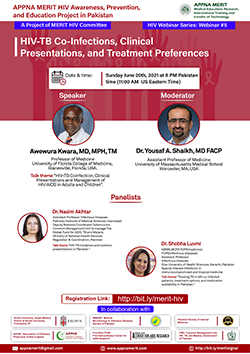 Webinar 5: HIV/TB Co-infections, Clinical Presentations and Treatment Options – 06/20/2021 Webinar 5: HIV/TB Co-infections, Clinical Presentations and Treatment Options – 06/20/2021
Tuberculosis and HIV requires prompt management and treatment to prevent further transmission and minimize the development of opportunistic infections. It is especially important that anybody diagnosed with Tuberculosis should be tested for HIV, and vice versa. For mono infection with Tuberculosis, treatment is straightforward and should be started immediately to prevent spread. In patients with Tuberculosis and HIV co-infection, pharmacotherapy options are reduced. The NRTIs (nucleoside/nucleotide reverse transcription inhibitors) do not have significant interactions and may be used for treatment.
Clinicians must assess the most appropriate available therapy for their patient, as well as any necessary dose adjustments. HIV counseling and prophylactic treatment, as well as procedures for infection control, should be implemented. Ensuring patients have access to treatment and medication as well as a supportive healthcare staff can help to decrease the stigma behind HIV testing, and implementing more frequent Tuberculosis testing when appropriate will decrease the incidence of co-infection.
View Webinar on YouTube Download Report 5
|
|
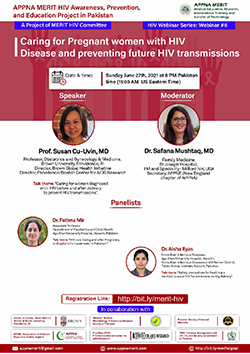 Webinar 6: Caring for pregnant women with HIV disease and preventing HIV Transmissions - 6/27/2021 Webinar 6: Caring for pregnant women with HIV disease and preventing HIV Transmissions - 6/27/2021
Education and the implementation of standard practices to help prevent and reduce maternal transmission of HIV to infants has been an ongoing topic of discussion. HIV transmission from mother to infant generally occurs during labor, delivery, and subsequent breastfeeding. Key prevention tactics include universal HIV testing for all pregnant women and the implementation of antiretroviral therapy and adherence to therapy after diagnosis. The Dolutegravir-based regimen is recommended as the preferred first-line treatment for people living with HIV. There is very low evidence of neural tube defects for women and adolescent girls of childbearing potential who begin therapy. For healthcare workers who are working with HIV positive women for the duration of their pregnancy, it is extremely important that they receive training on infection control, occupational post exposure prophylaxis policies, and the importance of testing and treatment with emphasis on decreasing healthcare stigma against the disease.
View Webinar on YouTube Download Report 6
|
|
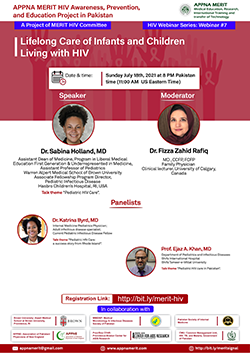
Webinar 7: Lifelong Care of Infants and Children Living with HIV – 7/18/2021
This webinar describes HIV infections and common clinical presentations of HIV in children, developmental effects, and pediatric HIV care in Pakistan. Though potentially preventable, most children are infected via mother-to-child transmission; these infections are compounded by poverty and challenges in access to healthcare, lack of HIV awareness, and limiting testing availability. HIV in children can lead to development delays, such as persistent weight loss, impaired brain growth, and/or motor defects. In Pakistan, 7 out of 50 ART centers are dedicated to pediatric care, while the remaining centers treat both adults and children. HIV medicine and diagnostic tests are provided free of charge in all pediatric ART centers. Regardless of this, challenges persist: there are very few Pediatric Infectious Disease Physicians in Pakistan, proper linkage between pediatric and adult ART centers do not exist, and accessing HIV children’s services can be challenging given remote locations. In the future, there is a need to expand pediatric HIV centers and care services as well as to extend medication and other services in highly burdened districts to care for HIV positive children in Pakistan.
View Webinar on YouTube Download Report 7
|
|
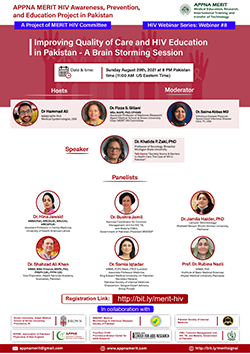 Webinar 8: Improving Quality of Care and HIV Education in Pakistan - A Brainstorming Session – 8/29/2021 Webinar 8: Improving Quality of Care and HIV Education in Pakistan - A Brainstorming Session – 8/29/2021
Improving the quality of care and educating medical personnel and the general public about HIV is critical to addressing the current state of HIV in Pakistan. In this webinar, speakers and participants reflected on lessons learned from the previous six webinars delivered in 2021 and methods to improve HIV education and care in Pakistan moving forward. In general, webinar hosts and participants agreed that an increase in routine testing, implementing mandatory HIV courses in medical school, and increasing awareness about the disease in general were critical steps to addressing Pakistan’s HIV epidemic. Additionally, an interdisciplinary approach to health care more generally, such as developing an understanding of health care as medical sociology beyond just physician-patient relationships, would also help address health care challenges in Pakistan.
View Webinar on YouTube Download Report 8
|
|
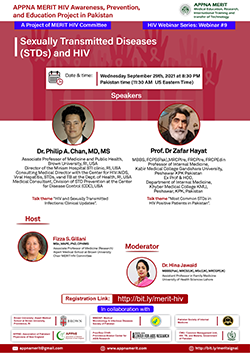 Webinar 9: Sexually Transmitted Diseases STDs and HIV – 9/29/2021 Webinar 9: Sexually Transmitted Diseases STDs and HIV – 9/29/2021
This webinar describes important information on STI prevention, recommended treatments for specific STIs, and the relationship between most STIs and HIV. The Centers for Disease Control and Prevention (CDC) recommends the ‘Five P’ approach to STI discussions, involving dialogue on: Partners, Practices, Protection (i.e., condoms), Past history, and Pregnancy. Having any STI significantly increases one’s risk of acquiring HIV infection. In Pakistan, the most common STIs include gonorrhea, syphilis, chlamydia, HIV, fungal candidiasis, and trichomonas. Due to stigma, many individuals attempt to hide all signs and symptoms of STIs. In order to combat stigma and prevent STIs in Pakistan, It is critical that STI education is implemented for politicians, religious leaders, students, and teachers, covering topics such as sexual behavior, mental health issues, and drug abuse in order to reduce disease prevalence.
View Webinar on YouTube Download Report 9
|
|
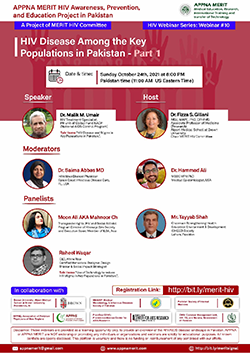 Webinar 10: HIV Disease Among the Key Populations in Pakistan Part 1 – 10/24/2021 Webinar 10: HIV Disease Among the Key Populations in Pakistan Part 1 – 10/24/2021
In Pakistan, there is significant stigma surrounding the HIV Disease and Key Populations (KP), including Pakistan’s Transgender population. Stigma and discrimination towards People Living with HIV (PLHIV) in Pakistan is pervasive, with fear and limited understanding of HIV transmission exacerbating this issue. Stigma is harmful to Pakistan’s health practice, families, and communities, and affects the ability for PLHIV to secure employment opportunities and live with dignity. In order to address these issues, Pakistan must ensure that the right to employment for PLHIV/KP is incorporated as an advocacy and human rights issue. Additionally, research institutions should undertake research to find evidence on employment-related stigma and discrimination so that targeted intervention strategies can be devised. Also, encouraging businesses and labor leaders to champion HIV anti-discrimination measures, deliver HIV education in work settings, and adopt other similar measures can help support the employment of PLHIV in Pakistan.
View Webinar on YouTube Download Report 10
|
|
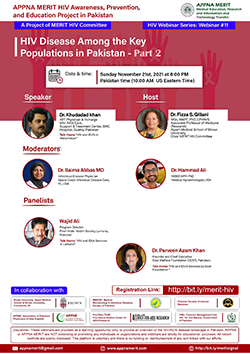 Webinar 11: HIV Disease Among the Key Population in Pakistan Part 2 – 11/21/2021 Webinar 11: HIV Disease Among the Key Population in Pakistan Part 2 – 11/21/2021
This webinar describes the HIV situation for Injection Drug Users (IDUs) in Pakistan. Specifically in Balochistan, two HIV/AIDS Centers provide HIV treatment to all registered patients free of cost, including IDUs. CoPCs (Continuum of Prevention and Care Services), funded by the Global Fund, were established in 2014 to provide comprehensive services to IDUs in Pakistan’s 30 districts. However, challenges for addressing HIV infection in IDUs remain, including the need for new syringes/needles, a limited budget for basic medical care, a need for increased detoxification and rehabilitation centers, and a need for general social services to support IDUs. The Dost Foundation in Pakistan provides services for IDUs, serving a population of approximately 4.4 million drug users in KPK/FATA and adjoined Punjab districts. The Dost Foundation focuses on drug demand reduction, HIV prevention and care, human rights, human resource development, and community development. Organizations such as the Dost Foundation can provide vital support to the public health sector in Pakistan and address the growing HIV epidemic.
View Webinar on YouTube Download Report 11
|
|
Webinar 12: Vision for HIV in Pakistan for 2022 – 12/19/2021
An update on the HIV Awareness, Prevention, and Education Project in Pakistan Report was published on World AIDS Day on December 1, 2021. This webinar described several key themes from the World AIDS Day report. These included: (1) Treatment as Prevention and measurement of Key Performance indicators to understand the percentage of patients who are newly diagnosed with HIV, those who are on ART, those who are virologically suppressed, and those who have died from HIV/AIDS-related deaths; (2) the Knowledge, Attitude, and Practice Gap, describing how HIV transmission is no longer confined to Key Populations, the general population is becoming infected due to unregulated use of contaminated needs and unscreened blood products, and discrimination and stigma is affecting HIV management and treatment adherence; and (3) Infection Prevention and Control, whereby external teams began training healthcare staff and managing treatment activities after the initial HIV outbreak in Pakistan. These trainings and management were not implemented in Pakistan's internal structures, and therefore, have not been fully adopted into Pakistan’s HIV prevention practices. Moving forward, these key themes must be emphasized as tools for preventing future HIV transmission and curbing the evolving HIV epidemic in Pakistan.
View Webinar on YouTube Download Report 12
|

%20(2022)250px.jpg)
%20(2022)250px.jpg)
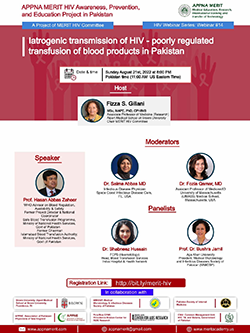
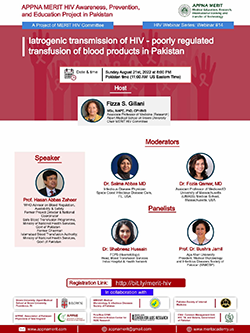

 Webinar 1: HIV Disease: Myths and Facts - 5/23/2021
Webinar 1: HIV Disease: Myths and Facts - 5/23/2021 

 Webinar 5: HIV/TB Co-infections, Clinical Presentations and Treatment Options – 06/20/2021
Webinar 5: HIV/TB Co-infections, Clinical Presentations and Treatment Options – 06/20/2021 Webinar 6: Caring for pregnant women with HIV disease and preventing HIV Transmissions - 6/27/2021
Webinar 6: Caring for pregnant women with HIV disease and preventing HIV Transmissions - 6/27/2021
 Webinar 8: Improving Quality of Care and HIV Education in Pakistan - A Brainstorming Session – 8/29/2021
Webinar 8: Improving Quality of Care and HIV Education in Pakistan - A Brainstorming Session – 8/29/2021 Webinar 9: Sexually Transmitted Diseases STDs and HIV – 9/29/2021
Webinar 9: Sexually Transmitted Diseases STDs and HIV – 9/29/2021 Webinar 10: HIV Disease Among the Key Populations in Pakistan Part 1 – 10/24/2021
Webinar 10: HIV Disease Among the Key Populations in Pakistan Part 1 – 10/24/2021 Webinar 11: HIV Disease Among the Key Population in Pakistan Part 2 – 11/21/2021
Webinar 11: HIV Disease Among the Key Population in Pakistan Part 2 – 11/21/2021